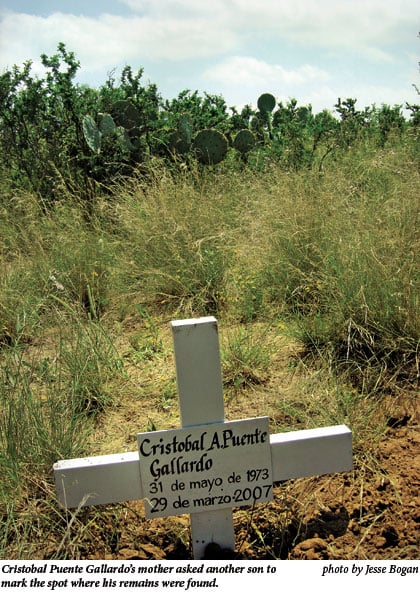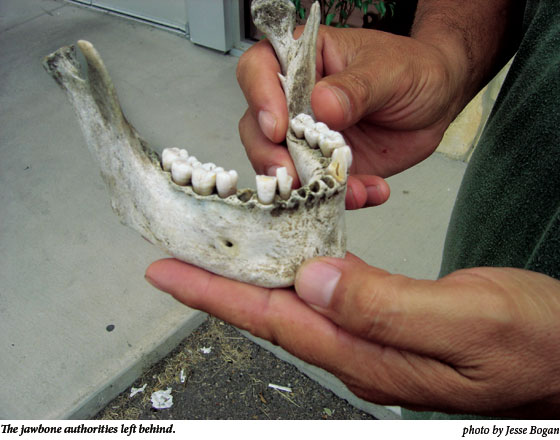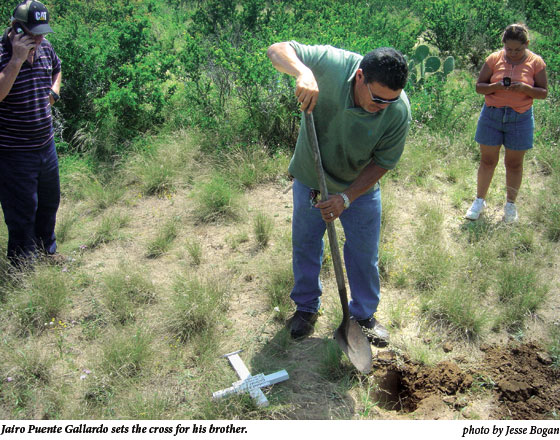The Jaws of Life
The border yields bones, but not answers.
It was a marvel that the remains were found, let alone identified. Animals had torn into Cristobal A. Puente Gallardo’s corpse, leaving a few leg bones and vertebra, and a jawless skull. Scattered nearby were shoes, a mangled T-shirt, ripped pants, two video game cartridges, and, miraculously, identification.
The grim discovery was made a day or two’s trek from the Rio Grande, in the middle of a vast, South Texas ranch near Eagle Pass, by a heavy equipment operator in March 2007.
Authorities gathered what there was and reasoned that Puente died from heat, dehydration, or some other natural cause. His family was notified, the books closed, and the paltry remains taken back to Nieves, Zacatecas, for entombment.
Except the jawbone.
Whether through haste or oversight, the jawbone was left behind. It ended up sitting on an end table in the home of Raymond Lazarski, a retired supervisor from the old-school Border Patrol who serves as caretaker on the ranch where Puente’s body was found.
Sometimes undocumented immigrants who cross the border find work and share the bounty with their families back home. Sometimes they die, leaving their families only questions that will never be answered.

Nieves is a town of abandoned mines, no stoplights, and divided families. A regular says, half jokingly, that if a man wants a wife, he can probably find five in the north central Mexico town. Most men go north.
Cristobal A. Puente Gallardo fled when he was a teenager. But after attending high school in Dallas, he returned home in 1992.
He owned two tortillerias and, unlike the local bean harvesters, carried the girth of success. Though he was a hothead who could be belligerent when he drank, locals respected him as an enterprising businessman.
One of a slew of siblings, he was the only brother to return and work in Nieves. The rest moved to Texas for good. By default, Puente became breadwinner to three women-his mother, widowed by a rollover accident that also took a son; his sister, a single mom; and his wife.
That life was only a matter of time. He apparently couldn’t afford to compete when other tortilla makers started delivering door-to-door on four-wheelers. With his wife pregnant with their fifth child, he left for Dallas again in May 2006 in search of better work.
Cash hidden in his sneakers, he was a few days shy of his 33rd birthday when he boarded a northbound bus. He brought along sample cartridges of the video games his kids loved so he could buy more at a flea market and send them home.
Some of Puente’s siblings had papers; he did not. When he arrived at the border town of Piedras Negras, just across the Rio Grande from Eagle Pass and seven hours southwest of Dallas, he agreed to a smuggling enterprise.
Not used to the dirty life, his mood soured after sleeping on the filthy floor of a safe house. He complained to relatives by telephone about eating beans and ants crawling on him. So he found a different coyote, named El Borrado for his light eyes. The one-way trip would cost $1,200 and entail a hike through the brush.
Puente had always been good about staying in contact, so when his relatives stopped hearing from him, they panicked. After a few days, they checked with immigration and law enforcement agencies on both sides of the border to see if he had been jailed or fit the description of recently found dead. They posted fliers and added a missing-person report to the Coahuila state police’s already burgeoning files.
Three relatives-all women-tried to arrange a meeting with El Borrado in Piedras Negras, but backed out after becoming worried that local police might be protecting him.
Ten months later, Puente’s remains were discovered a few miles away from an inland Border Patrol checkpoint on state Highway 57 that undocumented immigrants typically try to hike around.
The find brought some closure for his family, but they couldn’t believe that nobody in Puente’s group had helped him, or at least made an anonymous call to say he fell behind and could not keep up.
The hardest part for Mireya MartÃnez, 36, a naturalized U.S. citizen and hospital janitor in Waco, was coming back to the border and viewing her brother’s bones at a funeral home. She asked why the upper front teeth were missing from the skull.
Heat and animals were apparently responsible, she recalls being told. Hungry coyotes and wild hogs abound in the area, and the hot sun is unrelenting.
“But animals don’t eat teeth,” MartÃnez said in a recent interview, crying.

Human remains and scorched dreams weren’t anything new for Lazarski. He saw plenty during 30 years in the Border Patrol. “Welcome to the sovereign country of Maverick County,” Lazarski says when describing the history of savage death in the borderlands around Eagle Pass.
About a week after authorities gathered Puente’s remains from the ranch Lazarski oversees, the same heavy equipment operator discovered the jawbone had been overlooked.
He buried it. Lazarski found out and had the operator dig it up, reasoning it might be part of a crime scene. Lazarski says he called the Mexican consulate to report the find, but nobody returned his message. “If they don’t care about their own citizens, then why should I?” Lazarski asks.
Months passed, and the jawbone sat on the table at Lazarski’s home, at times unsettling his grown daughter. It nagged at Lazarski, too. The jawbone was mangled and bore marks that might have come from an assault. Maybe it wasn’t heat that killed Puente.
In August, a man from Dallas telephoned Lazarski, claiming to be Puente’s brother. He wished to visit and pray at the site where the remains were found. A clay pigeon aficionado known as an excellent shot, Lazarski was cautious about meeting the brother, partly because of his homegrown theory that it wasn’t exposure to heat that killed Puente.
Before going into the brush with a stranger under strange circumstances, Lazarski agreed to meet the man in a public place. He recommended the sun-baked Border Café. Half gas station, half restaurant, it is the local parliament for truckers and large, old men in denim and cowboy hats.
Puente’s oldest brother Jairo has come a long way since he left Nieves in the ’80s. He pulled up to the Border Café in an enormous red, new model Ford F-250 pickup.
Jairo, about 5 feet 10 inches tall, thick in the chest and belly, extended a friendly hand. He had a grasp of English, but tended to ramble.
Jairo fueled up the truck while two women, including his girlfriend Viki, entered the café and waited in awkward silence. Waitresses rolled silverware at a nearby table.
When Jairo sat down, Lazarski asked him for identification. Jairo handed over a permanent resident ID card and explained that he buys scrap seat stuffing in Mexican border towns and resells it to carpet padding manufacturers in Dallas.
“My mom gave me a small cross,” Jairo said, which he wanted to post as a marker in the brush where his brother died. He talked about the family Cristobal left behind and the life he led back in Nieves.
As if it were just regular, you-don’t-say-coffee talk, Lazarski suggested that somebody harmed Puente.
“You think somebody killed him?” Jairo asked.
“You’ll see,” Lazarski said.
Out in the parking lot, Lazarski dug around in the toolbox of his white pickup truck, then checked a bag behind the seat and found what he was looking for. He asked Jairo to come to the other side of the truck for a little privacy, and then the men were looking at a mandible, a human jawbone.
Lazarski pointed to a notch where the jaw attaches to the skull like a hinge; it was busted. Several teeth were gone; three were broken in half.
“Somebody hit him with a goddamn baseball bat or a fence post,” Lazarski said.
Heading out of town on state Highway 57, Lazarski peered into his rearview mirror at Jairo in the red truck. One of the women stayed behind, apparently because she did not have documents to clear the Border Patrol checkpoint.
“Looks like the old boy has a pretty good business,” Lazarski said. “He wasn’t just a poor wetback. The family has money-tortilleria … business in Dallas. Most people walking through the brush are poor as hell.”
Pulling off the highway, the two-truck caravan went down a grassy path bordering an endless fence line. Jairo drove with the jawbone resting on the center console of his truck cab, next to a white metal cross with the name “Cristobal A. Puente Gallardo” written across it in black. Noticing a large stock tank, he ruled out the idea that his brother had run out of water, though drinking from such sources in desperation sometimes makes passing immigrants sick.
“They killed my brother,” he said, “for money or something.”
Lazarski stopped about 2 miles in. The grass was tall, the sun high, and it was hot. Almost forgetting the cross, the group ducked under a taut, barbed-wire fence and walked past cacti and more brush. Lazarski, amazed by the growth from recent rains, picked a blue flower and gave it to Jairo’s girlfriend.
They stopped in a small clearing. “This is the space right here,” Lazarski said.
“They found the bones right here?” Jairo asked, pacing in the grass.
“There were parts of the bones, I think behind the bushes or some clothes by that stuff,” Lazarski said, pointing to a thicket. “I wasn’t sure I could find this place. … As you can see, it is damn far off the beaten path.”
Jairo dropped the cross in the clearing and set out into the surrounding brush to look for a heavy object somebody might have used as a club, and maybe for more remains. He stumbled around in a stupor, ending up on an overgrown ranch road. He mumbled during the search.
“Justice,” he said. “What is the reason they killed him?”
He found an old T-shirt, held it to his nose and inhaled to check if it had the foul smell of remains. Jairo moved on, keeping the shirt, and investigated a small pile of plastic, possibly from a water jug, so toasted it broke like a wafer.
Squatting again, he asked, “Is this bone?” It was wild mushrooms. He gave up the search.
It was time to set the cross.
As Jairo dug a hole in the loose dirt, Viki and Lazarski spoke on their cell phones, he with his daughter, who was concerned about his making the trip. Lazarski read her Puente’s full name off the cross and switched the topic to lunch.

“Oh, I don’t know, he’s about got the hole dug. Not too long,” Lazarski said.
Viki held the cross up as Jairo pushed soil in around it; he used a shovel handle to tamp it down tight around the base. He complained about ants already crawling on the cross.
While Viki answered another call, repeatedly asking if the person on the other end could hear her, Jairo dropped to his knees.
“Let me pray,” he said, shooing Viki away for privacy. He grabbed the crux of the cross with both hands, bowed his head and grieved. He asked questions in a mix of English and Spanish. How much did he suffer? How many days?
“Ah, nobody give you a hand. Oh, boy,” he said, breaking down, sweating through his green shirt. It was silent apart from chirping birds and Viki’s muffled telephone conversation. Lazarski stood with his cap in hand.
Before leaving, Jairo gathered a dirt clod for his mother, who also wanted pictures of the site.
After several rounds of iced tea back at the Border Café, Jairo reported to the Mexican consul and hand-delivered the jawbone to Maverick County sheriff’s investigators, who said they would send it to the medical examiner’s office in San Antonio for review.
A few weeks later, the jaw hadn’t been sent anywhere. Authorities said they would need more bones to compare it with and ensure it was Puente’s. That left relatives with the wrenching prospect of pulling the rest of his remains from the family crypt in Nieves or just leaving them in peace.
Even before the broken jaw surfaced, some of Puente’s relatives wondered if he had been killed. Brutal possibilities lurk on the border.
Texas Department of Public Safety forensic artist Suzanne Birdwell, based in Austin and not involved in the case, suggested that if relatives remain uncertain about the cause of death, they should hire a forensic anthropologist to study the remains.
“I just don’t want them to make that determination on one bone when there are 206 in the adult body,” she says. Based on a photograph, she says the damage to the jawbone did not seem out of the ordinary, given the 10 months that Puente’s remains were exposed to the sun and wild creatures with teeth capable of breaking teeth.
Birdwell was amazed that the bone sat around Lazarski’s home so long before being turned over to law enforcement. “I respect the experience that this rancher has, having worked in the Border Patrol many years; however, I don’t think it is up to him to hand it back to the family and then speculate,” she says. “His theory opened the family’s fears.”
Leaving the sprawling ranch that day in August, Lazarski retraced parallel ruts in the grass made on the drive in. He drove the overgrown farm road until he was back to gravel, then hardtop highway to Eagle Pass.
If it had not been for Lazarski, Jairo would not have known where to set the cross or obtained access to the site. After decades of tromping through South Texas brush and miles of riverbank along the international boundary, Lazarski had seen all the typical horror, from bloated corpses to bones draped in tattered clothes.
But being a guide for this trip jarred him a little.
“Oh, my gosh,” he said, driving back to town. “That was kind of wild.” ?
Freelance journalist Jesse Bogan recently wrote “Border Seen” and “Slow Death, Slower Justice” for The Texas Observer.


